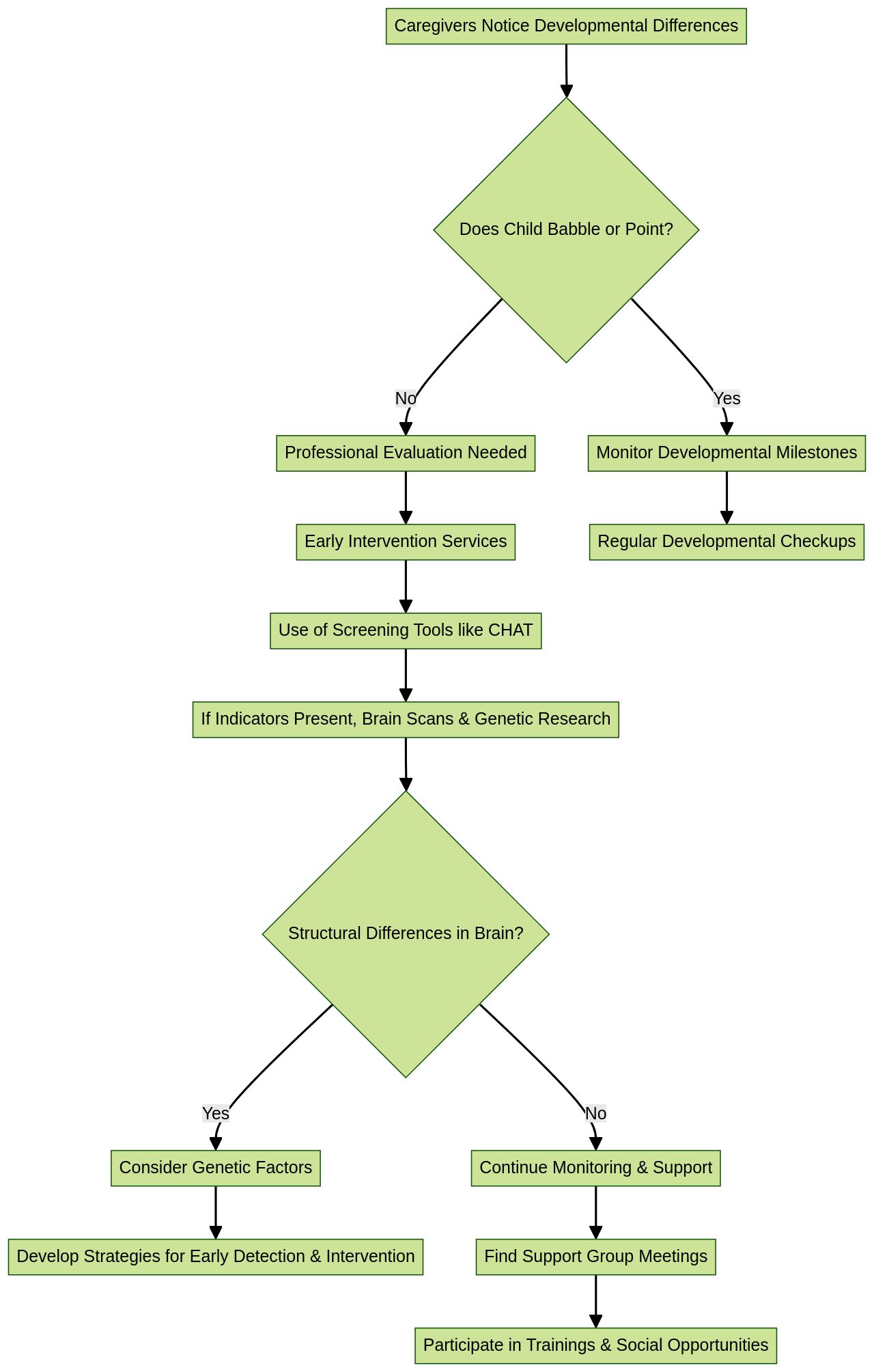Introduction
Autism Spectrum Disorder (ASD) is a complex neurodevelopmental condition that affects communication, social interaction, and behavior. Recognizing the early signs of autism is crucial for timely intervention and improved outcomes. Recent research has highlighted the supportive role of service dogs in enhancing family resilience and well-being.
This article explores the impact of autism on individuals and families, the signs and symptoms of autism, early identification, and the diagnostic process. It also discusses the importance of individualized interventions and the evolving understanding of autism's neurobiological aspects. With the prevalence of autism rising, it is imperative that awareness, screening, and support systems adapt to meet the growing needs of the autism community.
What is Autism?
Autism Spectrum Disorder (ASD) is a complex neurodevelopmental condition with a spectrum of symptoms affecting communication, social interaction, and behavior. Although symptoms can be detected in the first year of life, the average age of diagnosis is typically around 3 years or older.
Recognizing the early signs of autism is essential for timely intervention, which has been shown to significantly enhance outcomes for individuals with ASD. Recent research has broadened our understanding of autism's impact not only on individuals but also on their families.
Studies have highlighted the supportive role of service dogs in enhancing family resilience, emotional well-being, and social connections. These dogs are not just aids for the child with autism but become integral members of the family, fostering an environment of inclusion and understanding.
In light of these findings, the importance of individualized interventions that consider the whole family unit becomes clear. Research continues to delve into the neurobiological aspects of autism, investigating the roles of dopamine and serotonin in development and the potential for novel therapies, including stem cell treatments. As knowledge evolves, so does the potential for early identification and innovative interventions that address the unique challenges faced by individuals with ASD and their families. With the prevalence of autism rising, it is imperative that awareness, screening, and support systems adapt to meet the growing needs of the autism community.

Signs and Symptoms of Autism
Understanding the nuances of autism spectrum disorder (ASD) is crucial, as it manifests through various signs and symptoms which can be quite unique to each individual. Commonly, those with ASD might find social interactions challenging, often struggling with making eye contact or participating in back-and-forth conversation.
Their behaviors might include repetitive actions or they may have intensely narrow interests. Communication can be another hurdle, with a number experiencing a delay in language development or difficulty in interpreting and conveying nonverbal cues like gestures or facial expressions.
Insight into these experiences has been enriched by a study led by Dr. Maggie O'Haire from the OHAIRE Group at the University of Arizona College of Veterinary Medicine, published in Frontiers of Psychiatry. The research delved into the lives of families with children on the autism spectrum, assessing the impact of service dogs.
These dogs, as reported by the caretakers, not only supported the children with autism but also served as a beacon of resilience for the whole family. They improved social bonds, emotional wellness, and brought joy, thereby lessening feelings of judgment and stigma. This study underscores the importance of looking at autism's effects on the family unit as a whole, highlighting how service dogs can serve as an individualized intervention. The findings reveal that beyond assisting in managing ASD's characteristics, service dogs contribute to nurturing social connections and fostering an inclusive family environment.
Early Identification of Autism
Recognizing the early signs of autism is essential for initiating the right support and interventions. Caregivers are often the first to notice developmental differences that may indicate autism, such as a child not responding to their name, limited babbling, or a lack of pointing by their first birthday.
It's also crucial to observe if a child shows reduced interest in social interactions. While these indicators alone don't confirm autism, they suggest a need for professional evaluation.
Research underscores the importance of early intervention, particularly before age 3, yet children are often diagnosed around age 3 or later, missing out on early, critical support. Despite this gap, advancements in early detection, like the use of the CHAT instrument, are promising, with studies showing that early screening can help identify autism in children as young as 18 months. Furthermore, while the exact biological underpinnings of autism remain elusive, brain scans reveal structural differences, and genetic research suggests a hereditary component, dispelling myths that autism is caused by vaccines or parenting styles. This growing body of evidence about early signs and genetic links is vital for developing new strategies for early detection and intervention.

Diagnostic Process for Autism
When unraveling the complexities of autism, a multidisciplinary approach is crucial. Researchers, such as those from Dr. Maggie O'Haire's lab in the groundbreaking study published in Frontiers of Psychiatry, emphasize the significance of considering the whole family's experience.
Their qualitative study highlighted the transformative role service dogs play not only for children with autism but for their entire families. These canine companions are not merely pets; they are catalysts for resilience, enhancing social interactions, emotional well-being, and overall joy within the home.
In the realm of diagnostics, Autism Community in Action (TACA) and NeuroQure are revolutionizing how we identify autism spectrum disorder (ASD). With behavioral therapy proving more effective the earlier it commences, the push for rapid diagnosis is paramount.
NeuroQure's mission is to offer diagnostic clarity shortly after birth, reducing the typically protracted journey to an ASD diagnosis. To dispel myths, it's essential to note that ASD is not caused by vaccines, parenting styles, or nutrition.
Instead, brain scans reveal structural differences in individuals with autism, suggesting a genetic basis for the disorder. No single gene has been pinpointed, but researchers are delving into genetic code irregularities and potential environmental triggers. Service dogs, as part of this conversation, are being studied for their efficacy in promoting social connections and reducing stigma for families with autistic children. Canine Companions' partnership with the OHAIRE Group is a testament to this, showcasing the positive, wide-reaching impact these dogs have. Their study's promising results are a beacon of hope for families navigating the challenges of autism.

Impact of Autism on Individuals and Families
Autism, a neurodevelopmental disorder, shapes lives profoundly, influencing how individuals interact, communicate, and learn. Its spectrum nature means that experiences and symptoms vary widely, requiring tailored support and interventions.
According to the CDC's 2023 report, the prevalence of autism has escalated to 1 in 36 children, a stark increase from 1 in 125 in 2004. Early diagnosis, particularly by age 4, multiplies the likelihood of receiving essential services by fiftyfold.
Yet, disparities persist; White and Black children are more frequently diagnosed than Hispanic children, with barriers such as stigma, healthcare access, and language contributing to delayed identification in minority groups. Furthermore, boys are diagnosed around four times more than girls, partly because girls often present autism differently, leading to underdiagnosis.
The importance of early detection is underscored by initiatives like routine screening in well-baby checkups, which can identify signs of autism as early as 12–14 months. This early action, championed by the National Institute of Mental Health, can significantly enhance life outcomes.
Autism's impact continues into adulthood, with autistic individuals facing societal and psychological challenges. For many, common conditions like anxiety and depression require similar therapeutic approaches as for non-autistic individuals, yet autistic adults frequently report being turned away by healthcare providers. With additional training and understanding, practitioners can better serve this community, recognizing the unique strengths and establishing trust with autistic patients. A hopeful perspective on autism is essential, acknowledging each day as a new opportunity for growth and improvement. Despite the debates surrounding the rise in diagnoses, it is crucial to affirm the identity and experiences of autistic individuals as they navigate life's complexities.
Conclusion
In conclusion, early recognition of the signs of autism is crucial for timely intervention and improved outcomes. Recent research has highlighted the positive impact of service dogs in supporting families and fostering an inclusive environment.
It is essential to consider the whole family unit when providing individualized interventions. Identifying autism early allows for appropriate support and interventions.
Caregivers play a vital role in observing developmental differences that may indicate autism, such as limited babbling or reduced interest in social interactions. Advancements in early detection offer promising opportunities for early intervention.
A multidisciplinary approach to diagnosis, considering the experiences of the entire family, is essential. Service dogs have been shown to transform the lives of children with autism and their families, enhancing social connections and emotional well-being.
Autism has a significant impact on individuals, influencing their communication, social interaction, and learning. The rising prevalence of autism highlights the need for increased awareness, screening, and support systems to meet the growing needs of the autism community. Addressing disparities in diagnosis rates among different racial and ethnic groups is crucial. Approaching autism with hope and understanding is key, embracing individual strengths and providing tailored interventions. By empowering autistic individuals and their families to navigate life's challenges with resilience and support, we can ensure better outcomes for all. Together, we can create a more inclusive society that recognizes and values the unique contributions of individuals with autism.




